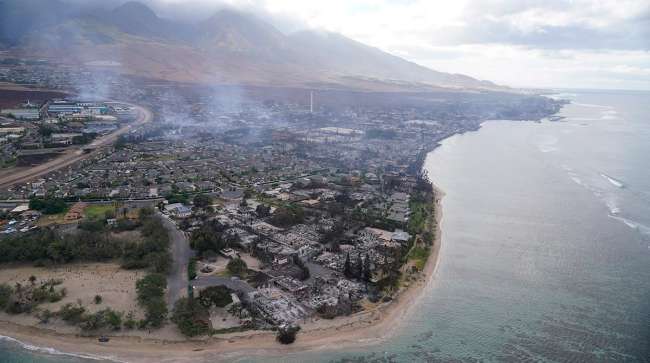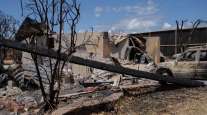Staff Reporter
Hawaii Ports Tackle Relief Efforts, Container Congestion

[Stay on top of transportation news: Get TTNews in your inbox.]
Hawaii has temporarily waived Kahului Harbor wharfage fees for inbound cargo to help relief efforts after the devastating Lahaina fire in Maui on Aug. 8 as one local transport company halted supply shipments due to port congestion.
Relief efforts have been coordinated since Aug. 15 by county, state and federal officials working with community partners to distribute donations for Maui fire victims.
Hawaii’s Lt. Gov. Sylvia Luke has been put in charge of spearheading assistance by Gov. Josh Green. A new donation storage and sorting center has been opened at a state-owned warehouse near Kahului Airport.
Storage and sorting distribution centers are being stood up on Oahu. The state is encouraging people outside of Maui to collect and sort donated items, then work with a Maui receiver (family member, friend or nonprofit running a donation drive). High-demand supplies include nonperishable food, water, hand-washing stations, water totes, outdoor sinks, portable charging devices/stations, batteries, wheelchairs and tents. Clothing donations aren’t needed now.
A Hawaiian logistics, moving and storage company, M. Dyer Global of Pearl City, reached out to Transport Topics about its relief efforts. M. Dyer had filled six full ocean containers with donated items to Maui with a total gross weight of 200,000 pounds.
The company stated it temporarily halted taking donations on Aug. 15 “due to an operational pause, for the port to reset for essential items only.” Anthony Shipp, its president and CEO, released a short video noting it had been asked by the ocean liners to momentarily stop sending donations because “the containers are getting backed up in Maui.” Once things reset and we get a better idea of what we can do and be more specific on the aid [needed], we’ll certainly reach out via social media and let everybody know how they can contribute.”
He thanked those who gave items and volunteered in handling the goods. “We’ve built numerous loads. They’re all going outbound to Maui. They’re going to end up in the right hands,” he said.
Until Sept. 10, the state department of transportation waived wharfage fees at the Maui harbor for a wide variety of cargo types, including vehicles, island agricultural goods, diesel, gasoline, other fuel and loaded containers (in varying lengths from 20 to 45 feet).
“This waiver shall be granted upon receipt of a wharfage report accompanied by documentation confirming that wharfage fees were not charged by a shipping company to a customer for the specified cargo,” HDOT stated. Additional instructions on the waiver will be posted to the state Harbors website at https://hidot.hawaii.gov/harbors/.
Operation House Maui Update: Huge mahalo to everyone in the community for donating food, supplies, financial resources, and their time for Maui `Ohana in need. pic.twitter.com/8ExIlQ9Fad — Governor Josh Green (@GovJoshGreenMD) August 17, 2023
Additionally, when berth space is available during the emergency period, HDOT will waive port entry and dockage for vessels displaced from small boat harbors on Maui. Port entry arrangements should be made through an agent to respective Harbors District Offices because other rules and fees will apply.
When Ed Sniffen, HDOT director, made the wharfage announcement Aug. 11, he said, “We have to offer any help we can at this time for the people of Maui. This will lessen the burden on shipping necessities to many who now have nothing.”
The county of Maui has set up a wildfire relief support website called Maui Nui Strong, which has information grouped in three main categories for those seeking support, people who want to volunteer or others who want to donate or offer services.
It notes that Aloha United Way has created the Maui Relief Fund that will give donations directly to efforts supporting fire victims to provide immediate financial assistance through grants to nonprofits at the forefront of relief efforts and directly help households “deeply affected by the fire.” It states that 100% of the funds will stay in Hawaii.
An estimated 3,000 animals from Lahaina are lost or missing, said Katie Shannon from the Maui Humane Society, which is trying to reunite pets with their owners. pic.twitter.com/79ojCDaZPu — The Associated Press (@AP) August 15, 2023
The Maui government fire relief website also points to the Maui Humane Society’s website, which names two locations where veterinarians are stationed to treat pets. It also has donation information for those wishing to help it treat animals injured by fire and smoke inhalation. It says that pet supplies and emergency kits will be provided to shelters so owners can stay with their pets.
The Maui website also lists the Salvation Army in Hawaii, which is providing emergency food boxes, meals-to-go and emotional/spiritual support at several locations. It offers information about how to donate as well as help for fire victims.
The American Red Cross is also providing assistance to victims. It has worked with local officials to provide over 4,200 overnight shelter stays in 12 emergency shelters on Maui and Oahu.
“With partners, we have provided more than 28,600 meals and snacks to people in need,” the Red Cross noted. “We have received more than 2,100 reunification information requests and have successfully completed more than 550 of these.”
It is encouraging financial donations as the “quickest and best way to help those who need it most,” especially in obtaining shelter.
Hawaii Department of Transportation installing dust screens around Lāhainā Town. You can find out more at https://t.co/cfFLKBjoUT — Hawaii DOT (@DOTHawaii) August 16, 2023
On Aug. 16, HDOT began a monthlong process to install dust screens around fire-ravaged towns to reduce the spread of potentially hazardous materials across the roadways, especially “to protect highway users along Honoapiilani Highway (Hawaii Route 30) and the Lahaina Bypass (Hawaii Route 3000).” The dust screens will not interfere with recovery efforts there.
Want more news? Listen to today's daily briefing below or go here for more info:




